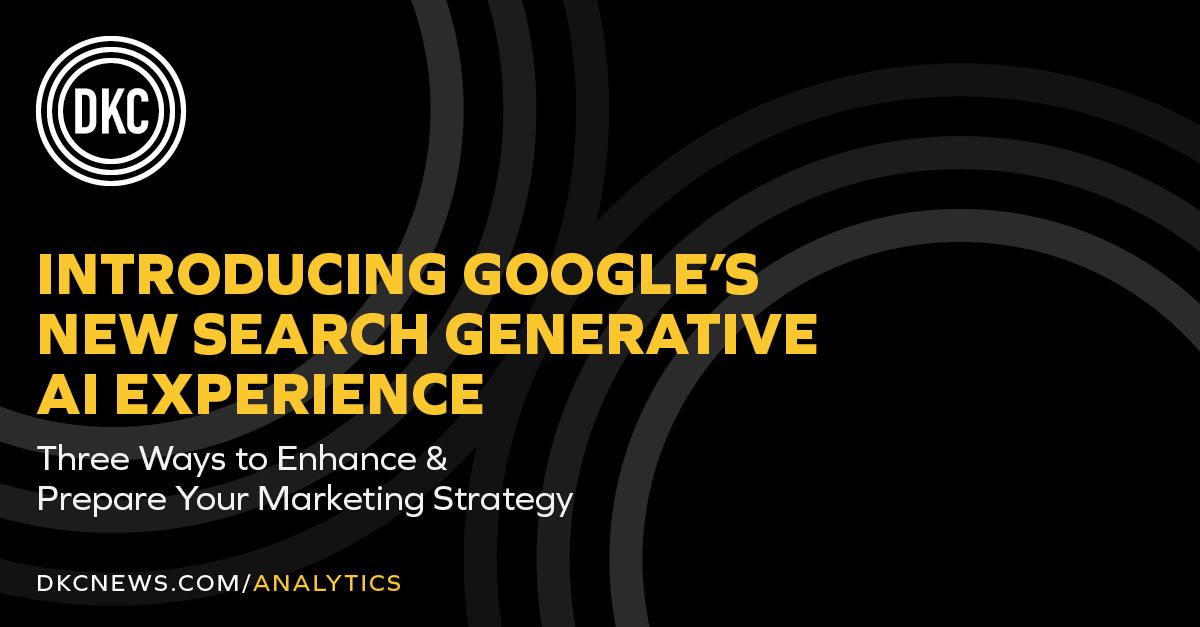Aug 28, 2023
Blog

Share this Blog Post
Google announced new ways their search engine may change in the future; it’s important for advertisers and business owners to adapt and take full advantage as soon as possible.
Introducing Google’s generative AI experience
First, what is it?
Google’s generative AI experience is a form of AI that can create content such as images, texts and even music. It’s Google’s answer to the increasing interest and usage of AI, merging Google’s search engine with Chat-GPT properties.
Rather than just providing links to external sources, the Artificial Intelligence will generate answers to user queries.
Here are the three ways Google’s new generative AI experience may affect your digital marketing strategy and what you can expect:
AI snapshot may replace SEO snippets, leading to a decrease in snippet click-through rate.
As of now this experience is opt-in only, but if the experiment proves successful, we should expect SEO snippet CTR to reduce as Google rolls out AI snapshot.
To win in this landscape your website should:
Be Clear
It’s important to be clear, concise, and unambiguous in your language on your website so when someone types a query, Google can easily understand what the business is, what it does and more importantly who is the target audience of that business.
Be Credible
Build backlinks and reviews so that the system knows that your website is relevant, credible, and reliable to send traffic. No one likes clicking on unrelated websites and neither does Google.
AI Snapshots have three links instead of the traditional one and gathers information from multiple sources after user types in a query for example: “how to get more subscribers on YouTube.”
Example of normal SEO snippet:
New generative AI snapshot:
The industry is moving towards conversational searches.
For SEO, content will need to be optimized to adjust for a more conversational type of search to improve qualified traffic.
For paid campaigns, unique, long-tail search terms are going to start giving advertisers a case to use phrase and broad match keywords more frequently in their ad account in an attempt to capitalize on these new potential searches. We can expect long-tailed searches will increase as we move towards a more conversational search-based world. With this, regularly monitoring search terms and adding negative keywords will start to be even more important.
Want to chat with an expert about utilizing Google Ads to take your organization to the next level? Contact us here!
For instance, say you decide to buy a car, and you type “good car with under 150,000 miles for sale”.
To narrow down your search, you type “used one”; AI will remember your search was about cars under 150K miles.
If this isn’t exact enough, then you narrow down further by typing “show the Toyotas”. This is the result.
You’ll get a snapshot with 3 links of sources that best match what you want.
What this means:
- Google has announced to advertisers that Performance Max campaigns integrated with shopping ads will become more important in the future.
- If a result matches the query, the advertiser that uses more relevant image extensions may result in an increase in CTR since it would closely align with the searcher’s intent.
Loss of SEO traffic but increased conversion rate due to higher quality traffic
The new Search Generative Experience may result in lower organic traffic due to Google prioritizing the AI’s generated responses and answers.
It’s not a stretch to say searchers may rely on and trust results pulled from multiple sources compared to traditionally one source at a time.
But on the bright side, once a searcher does click on the source and the website is optimized there should be a higher conversion rate due to Google’s Search Generative AI pulling traffic that is much more educated, qualified, and deliberate on what they are searching for.
Google is always growing so it’s important to keep up to date and not fall behind. If you are interested and would like a reputable company on your team or more information on using Google to advertise you can contact us here or email kirylspence@dkcnews.com.





